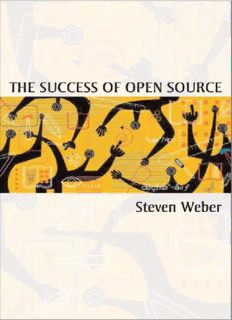
The Success of Open Source PDF
Preview The Success of Open Source
THE SUCCESS OF OPEN SOURCE STEVEN WEBER The Success of Open Source HARVARD UNIVERSITY PRESS Cambridge,Massachusetts,andLondon,England 2004 Copyright©2004bythePresidentandFellowsofHarvardCollege Allrightsreserved PrintedintheUnitedStatesofAmerica LibraryofCongressCataloging-in-PublicationData Weber,Steven,1961– Thesuccessofopensource / StevenWeber. p. cm. Includesbibliographicalreferencesandindex. ISBN0-674-01292-5(alk.paper) 1.Opensourcesoftware. I.Title. QA76.76.S46W43 2004 005.3—dc22 2003056916 Manyofthedesignationsusedbymanufacturersandsellerstodistinguishtheir projectsareclaimedastrademarks.Wherethosedesignationsappearinthis bookandHarvardUniversityPresswasawareofatrademarkclaim,the designationshavebeenprintedininitialcapitalletters(forexample, Microsoft). Contents Preface vii 1 PropertyandtheProblemofSoftware 1 2 TheEarlyHistoryofOpenSource 20 3 WhatIsOpenSourceandHowDoesItWork? 54 4 AMaturingModelofProduction 94 5 ExplainingOpenSource:Microfoundations 128 6 ExplainingOpenSource:Macro-Organization 157 7 BusinessModelsandtheLaw 190 8 TheCodeThatChangedtheWorld? 224 Notes 275 Index 303 Preface SeveralyearsagowhenIbeganthinkingaboutopensourcesoftware,I had to convince just about everyone I talked to, outside of a narrow technology community, that this was a real phenomenon and some- thing worth studying in a serious way. I no longer have to make that case.Opensourcehasbecomeasubjectofrealinteresttoawide-rang- ingswathofpeopleandorganizations.Ihopethisbookwillexplainto manyofthosepeoplehowtheopensourceprocessworksandwhythe successofopensourceisbroadlysignificant. I’m a political scientist and I worry more about how communities are governed than I do about technology per se. I became interested inopensourceasanemergingtechnologicalcommunitythatseemed tosolvewhatIseeasverytrickybutbasicallyfamiliargovernanceprob- lems,inaveryunfamiliarandintriguingway.IntheendI’vedecided, and I argue in this book, that the open source community has done somethingevenmoreimportant.Byexperimentingwithfundamental notions of what constitutes property, this community has reframed and recast some of the most basic problems of governance. At the same time, it is remaking the politics and economics of the software world.Ifyoubelieve(asIdo)thatsoftwareconstitutesatoncesomeof thecoretoolsandcorerulesforthefutureofhowhumanbeingswork together to create wealth, beauty, new ideas, and solutions to prob- lems, then understanding how open source can change those pro- cessesisveryimportant. Ihadahugeamountofhelpandsupportinwritingthisbook.The viii (cid:127) Preface University of California at Berkeley, the Ford Foundation, the Markle Foundation, the Social Science Research Council, the Institute on GlobalConflictandCooperation,andUniversityofCalifornia’sIndus- try-University Cooperative Research Program made bets that I would produce something valuable. My close friends and colleagues at the Berkeley Roundtable on the International Economy, Global Business Network,andtheMonitorGroupmadetheirbetsaswellbutmoreim- portantlygavemethegiftofgreatideasandprobingquestions.More peoplethanIcanpossiblyrememberfrommanydifferentwalksoflife readversionsofchapters,talkedmethroughstickyproblems,andput upwithmysometimesnaïvequestions.Ioweparticularlylargethanks to Jonathan Aronson, Michael Barnett, David Bollier, Denise Caruso, Peter Cowhey, Jerome Feldman, Brad DeLong, Rana Nanjappa, Elliot Posner, AnnaLee Saxenian, Janice Stein, Mark Stone, Nick Ziegler, JohnZysman,andagroupofthebestgraduatestudentsintheworld. And a special thanks to Michael Aronson and Elizabeth Collins from HarvardUniversityPress. AndofcourseIowethegreatestthankstotheopensourcecommu- nitiesIhavestudiedandtothepeoplewhocontributetheirtimeand energytothatwork.Iknowyouweren’ttryingtobuildahugedataset for some researcher to come in and understand how you were doing whatyouweredoing.Youarejusttryingtobuildthebestsoftwareyou can in the way that makes sense to you. I hope I’ve done some justice to that effort in my attempts to understand what makes open source succeedandwhythatsuccessmattersasmuchasIthinkitdoes. I want to dedicate this book to my three life partners, who helped me through every day I worked on it. Even though only one of them walksontwolegs. CHAPTER 1 Property and the Problem of Software Thisisabookaboutpropertyandhowitunderpinsthesocialorgani- zation of cooperation and production in a digital era. I mean “prop- erty”inabroadsense—notonlywhoownswhat,butwhatitmeansto ownsomething,whatrightsandresponsibilitiespropertyconfers,and wherethoseideascomefromandhowtheyspread.Itisastoryofhow social organization can change the meaning of property, and con- versely, how shifting notions of property can alter the possibilities of socialorganization. Iexplainthecreationofaparticularkindofsoftware—opensource software—asanexperimentinsocialorganizationaroundadistinctive notionofproperty.Theconventionalnotionofpropertyis,ofcourse, the right to exclude you from using something that belongs to me. Propertyinopensourceisconfiguredfundamentallyaroundtheright to distribute, not the right to exclude. If that sentence feels awkward on first reading, that is a testimony to just how deeply embedded in ourintuitionsandinstitutionstheexclusionviewofpropertyreallyis. Opensourceisanexperimentinbuildingapoliticaleconomy—that is,asystemofsustainablevaluecreationandasetofgovernancemech- anisms. In this case it is a governance system that holds together a communityofproducersaroundthiscounterintuitivenotionofprop- ertyrightsasdistribution.Itisalsoapoliticaleconomythattapsintoa broad range of human motivations and relies on a creative and evolv- ing set of organizational structures to coordinate behavior. What wouldabroaderversionofthispoliticaleconomyreallylooklike?This 1
Description: